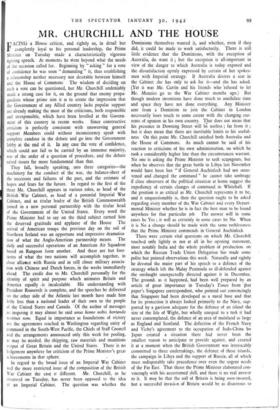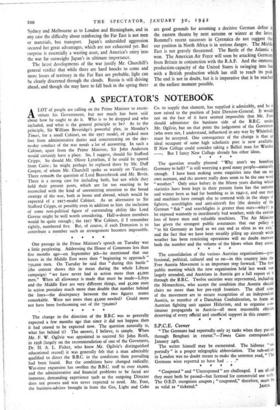MR. CHURCHILL AND THE HOUSE
FACING a House critical, and rightly so, in detail but completely loyal to his personal leadership, the Prime Minister on Tuesday made a characteristically vigorous fighting speech. At momenta he went beyond what the needs of the occasion called for.. Beginning by " asking " for a vote of confidence he was soon " demanding " it, thus establishing a relauonship neither necessary nor desirable between himself and the House of Commons. The wisdom of deciding on such a vote can be questioned, but Mr. Churchill undeniably made a strong case for it, on the ground that enemy propa- gandists whose prime aim it is to create the impression that the Government of any Allied country lacks popular support are already making the most of the criticisms, both responsible and irresponsible, which have been levelled at the Govern- ment of this country in recent weeks. Since constructive criticism is perfectly consistent with unswerving general support Members could without inconsistency speak with complete candour in the debate and go into the Government lobby at the end of it. In any case the vote of confidence, which could. not fail to be carried by an immense majority, was of the order of a question of procedure, and the debate raised issues far more fundamental than that.
They fall, broadly speaking, into three categories—the machinery for the conduct of the war, the- balance-sheet of the successes and failures of the past, and the estimate of hopes and fears for the future. In regard to the first of the three Mr. Churchill appears in various roles, as head of the British War Cabinet, as head of a potential Imperial War Cabinet, and as titular leader of the British Commonwealth joined in a new personal partnership with the titular head of the Government of the United States. Every word the Prime Minister had to say on the third subject earned him the deserved gratitude and applause of the House. The arrival of American troops the previous day on the soil of Northern Ireland was an opportune and impressive dramatisa- tion of what the Anglo-American partnership means. The daily and successful operations of an American Air Squadron based on Rangoon form another. And these are but fore- tastes of what the two nations will accomplish together, in close alliaftce with Russia and in still closer military associa- tion with Chinese and Dutch forces, in the weeks immediately ahead. The credit due to Mr. Churchill personally for the identity of spirit and purpose whkh animates Britain and America equally . is incalculable. His understanding with President Roosevelt is complete, and the speeches he delivered on the other side of the Atlantic last month have made him little less than a national leader of their own to the people of the United States and Canada. Of the author of messages so inspiring it may almost be said unus liomo nobis hortando restituit rem. Equal in importance as foundations of victory are the agreements reached in Washington regarding unity of command in the South-West Pacific, the Chiefs of Staff Council and the arrangements announced only this week for pooling, as may be needed, the shipping, raw materials and munitions output of Great Britain and the United States. There is no lodgement anywhere for criticism of the Prime Minister's great achievements in that sphere.
In regard to the broad issue of an Imperial War Cabinet and the more restricted issue of the composition of the British War Cabinet the case is different. Mr. Churchill, as he observed on Tuesday, has never been opposed to the idea 01 an Imperial Cabinet. The question was whethet the Dominions themselves wanted it, and whether, even if they did, it could be made to work satisfactorily. There is still little evidence that the Dominions, with the exception of Australia, do want it ; but the exception is all-important in view of the danger to which Australia is today exposed and the dissatisfaction openly expressed by certain of her spokes- men with Imperial strategy. If Australia desires a seat in the Cabinet she has only to ask for it—and she has asked. (Yet it was Mr. Curtin and his friends who 'refused to let Mr. Menzies go to the War Cabinet months ago.) But though modern inventions have done much to annihilate time and space they have not done everything. Any Minister sent from a Dominion to join the Cabinet in London necessarily loses touch to some extent with the changing cur- rents of opinion in his own country. That does not mean that his presence in Downing Street will be useless ; far from it ; but it does mean that there are inevitable limits to his useful- ness. On this point Mr. Churchill satisfied both Australia and the House of Commons. As much cannot be said of his reaction to criticisms of his own administration, on which he took a considerably higher line than the circumstances warrant. No one is asking the Prime Minister to seek scapegoats, but when he observes that the great battle in Libya last November would have been lost " if General Auchinleck had not Inter- vened and changed the command " he cannot take umbrage if close observers of the political situation at home suggest the expediency of certain changes of command in Whitehall. If the position is as critical as Mr. Churchill represents it to be, and it unquestionably is, then the question ought to be asked regarding every member of the War Cabinet and every Depart- mental Minister whether he is in fact the best man to be found anywhere for that particular job The answer will in some cases be Yes ; it will as certainly in some cases be No. When it is No a change should be made with the same ruthlessness that the Prime Minister commends in General Auchinleck There were certain vital questions on which Mr. Churchill touched only lightly of not at all in his opening statement, most notably India and the whole problem of production. on which the Russian Trade Union Delegation has made some polite but pointed observations this week. Naturally and rightly he devoted the major part of his speech to a defence of the strategy which left the Malay Peninsula so ill-defended against the onslaught unexpectedly directed against it in December. The ground, as it happened, had been well prepared by an article of great importance in Tuesday's Tones from that paper's Singapore correspondent, who pointed out convincingly that Singapore had been developed as a naval base and that for its protection it always looked primarily to the Navy, sup- ported by a garrison adequate for the defence of an island the size of the Isle of Wight, but wholly unequal to a task it had never contemplated, the defence of an area of mainland as large as England and Scotland. The defection of the French Navy and Vichy's agreement to the occupation of Indo-China by Japan created a situation there had never been the smallest reason to anticipate or provide against, and created it at a moment when the British Government was irrevocably committed to three undertakings, the defence of these islands, the campaign in Libya and the support of Russia, all of which must indisputably take precedence over even the urgent needs of the Far East. That thesis the Prime Minister elaborated con- vincingly with his accustomed skill, and there is no real answer to it. It may be that the soil of Britain is being over-insured, but a successful invasion of Britain would be as disastrous to Sydney and Melbourne as to London and Birmingham, and in are good grounds for assuming a decisive German defeat in any case the difficulty about reinforcing the Far East is not men the eastern theatre by next autumn or winter at the latest or materials, but transport. Japan's unheralded aggression Rommel's recent successes in Cyrenaica do not suggest that secured her great advantages, which are not exhausted yet. But our position in North Africa is in serious danger. The Middle surprise is essentially a wasting asset, and America's entry into East is not gravely threatened. The Battle of the Atlantic is the war far outweighs Japan's in ultimate importance. won. The American Air Force will soon be attacking Germany



























 Previous page
Previous page